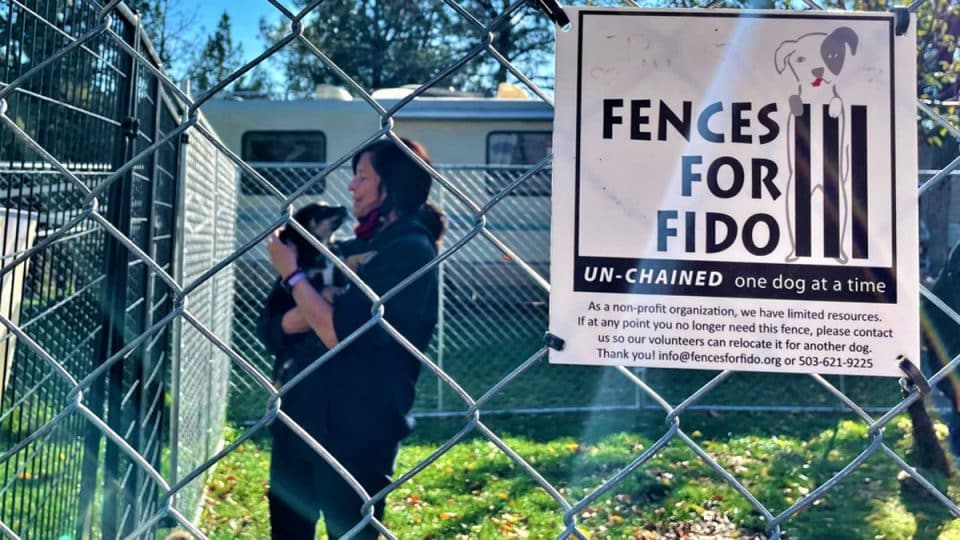Sparky spent her life chained up in her Oregon yard and was very frightened, charging anyone who came near her. That all changed when a nonprofit group called Fences for Fido stepped in to help.
Portland-based Fences for Fido (FFF) builds fences in Oregon and Southwest Washington state free of charge for families who keep their dogs on chains, tethers, and in small enclosures. In addition to the fence, they provide an insulated doghouse for each dog as well as food, toys, spay/neuter services, and emergency veterinary care.
The idea for FFF was hatched in 2009 when a group of friends gathered to watch a favorite TV show.
“We would meet every Thursday night to watch The Bachelor and drink wine,” FFF co-founder Katrina Kennedy said with a chuckle.
Kennedy said many in the group were animal lovers and they had heard about an unchaining group in North Carolina, so they decided they wanted to do something similar.
“We felt like it would be feasible to find one dog a month to unchain,” she said. “We knew that we would have to create a nonprofit. I don’t think we ever planned it to be as big as it is. I think we had just thought this is something we’ll do together.”
Their first fundraiser exceeded their goal, and by the end of the year, they had a wait list.
“And we are pretty much wait listed for the last 13 years, which is sad, that it’s that prevalent of an issue,” said Kennedy.
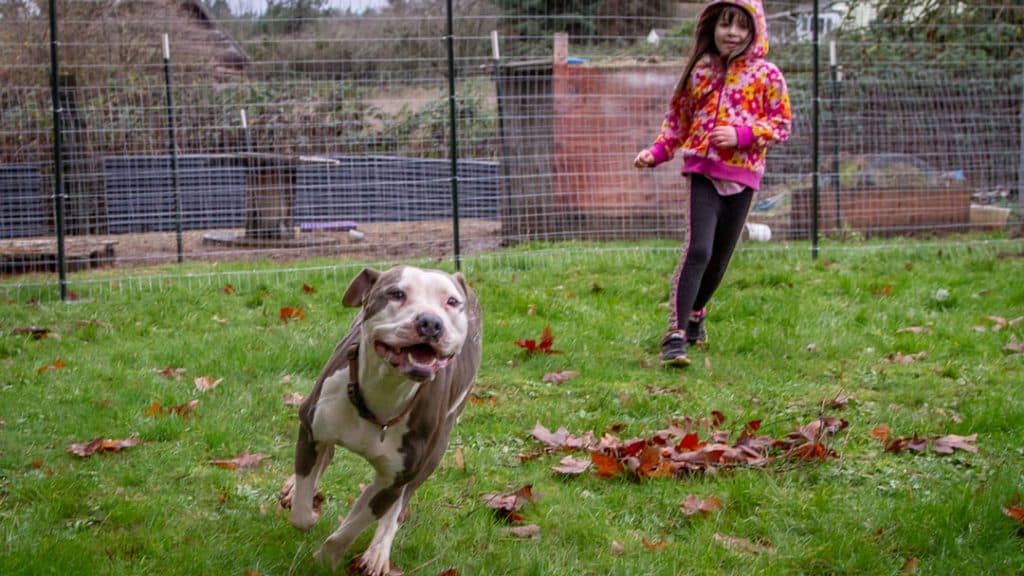
Since 2009, Fences for Fido volunteers have helped unchain nearly 3,000 dogs. Photo Courtesy of FFF
Good Fences Make Good Neighbors (and Good Dogs)
Dogs are social animals and the loneliness and isolation of being chained can be severely distressing for a dog. According to the American Veterinary Medical Association, this can lead to aggressive behavior. A chained dog cannot retreat so may be more inclined to bite.
In addition, a chained dog is at risk of strangulation and injury, attacks from other animals, and may be unable to reach their food, water, or shelter.
Fences for Fido’s mission is simple—to give dogs a better life.
“We focus on dogs that are changed chronically, like 24/7, never get to go in the house,” said Kennedy. “These are dogs that are just placed in backyards as pretty much an alarm system.”
Kennedy said often the dogs are chained or penned due to the way the dog owner (FFF calls them “guardians”) was raised.
“It’s like a generational thing like, well, this is okay to do to the dogs, this is okay to do to animals,” she said. “And so, it’s like we’re reeducating people.”
Kennedy said typically what they see is either a doghouse that’s dilapidated, or no doghouse at all. The dog is under a tree on a 6-to-8-foot chain, maybe paper plates for the food, no toys.
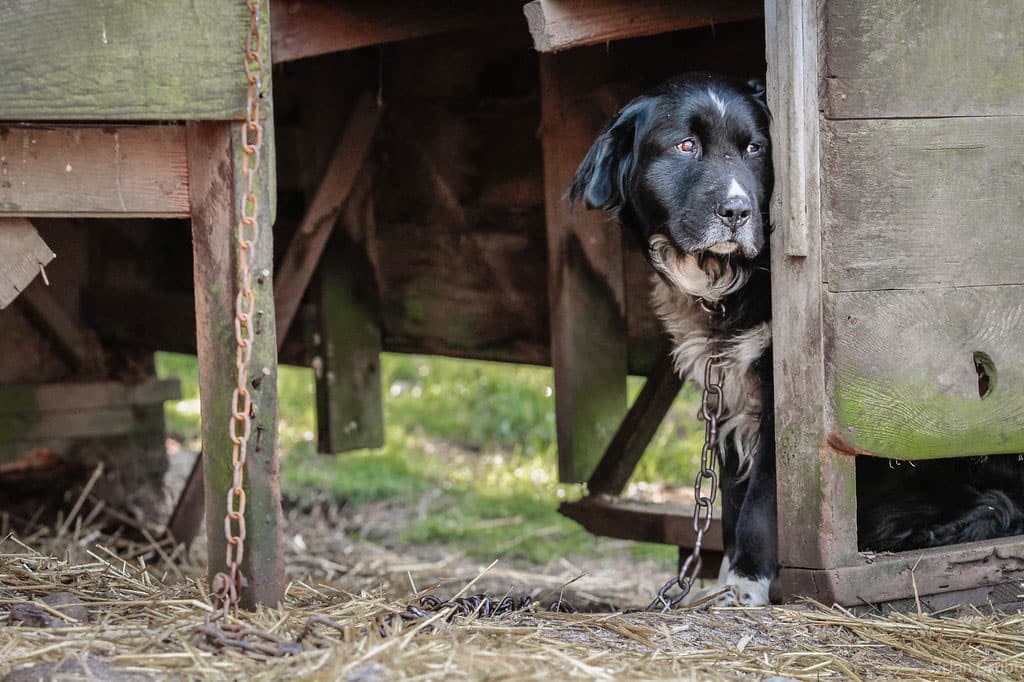
The loneliness and isolation of being chained can be severely distressing for a dog. Photo Courtesy of Fences for Fido
She recalled one heartbreaking case of a large mixed-breed dog.
“It was a very strong dog. It had an X harness chain on his belly and on his back. That’s how it was on him,” she said. “And I think that dog had had that on him for eight years. So, we had to peel that chain off of him, and then I’ll never forget it because I was one of the people that peeled it off. It had embedded, like he wasn’t bloodied or infected, but his fur had grown over it and the chain made a crisscross pattern.”
Kennedy said the family had the chain custom made so the dog couldn’t escape.
Even in that case, the family was within the law.
“The bar is set pretty low for animals,” said Kennedy. “Even in states with what we think are good animal laws, it’s still pretty low.”
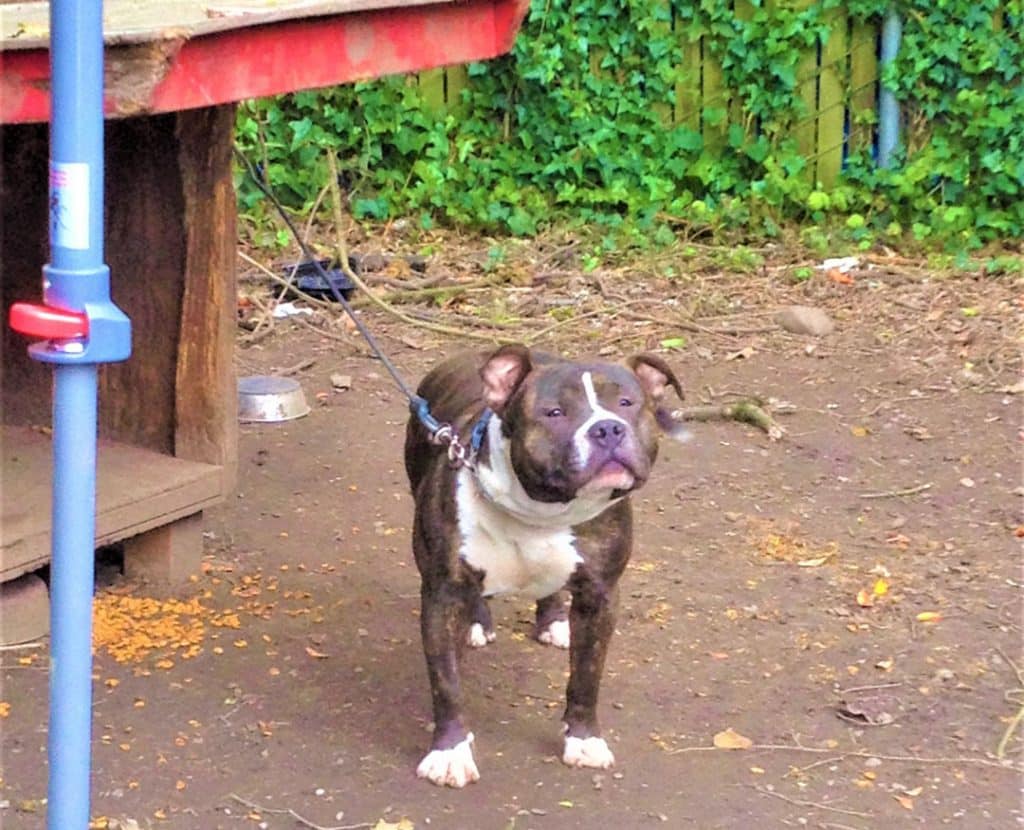
Dogs are frequently found on a short tether or chain. Photo Courtesy of FFF
Kennedy said while many would deem that case neglect, it wasn’t neglect according to the law.
“There wasn’t any physical abuse or anything like that,” she said. “So, in those situations we just want to set the dog up, and we do a fair amount of what I call social work. We kind of stay on the families. We check in to make sure that things are doing good.”
Often the work is done in lower income neighborhoods.
We’d much rather focus on keeping families together than tearing them apart.
“Those are usually the communities we do see the chained dogs in most of the time, and those neighbors, people in that community, they see us do that work. And I think it definitely kind of spreads a message, a positive message, because we will get community members that say, ‘Hey, I saw you guys were at this neighbor’s house, do you think you could help us with a fence?’”
Kennedy said there’s no judgement.
“These aren’t bad people,” she said. “They’re just people who don’t know any different, and also don’t have the income to do differently. And usually when you don’t have the income to do differently, you are so otherwise focused on trying to make the rest of your life work, you know, you can’t put your attention there with this animal.”
Keeping Families Together
Kennedy said she gets phone messages from people who question why the organization builds fences rather than rehome the dog.
“Do they know how packed shelters are?” she said. “I mean, dogs are getting euthanized left and right, because no one will adopt them. You know, dogs sit in a small pen at the shelter for years, maybe waiting. The people just don’t think about that. They don’t think about the bigger picture.”
Even if the dog is chained, that is what the dog knows.
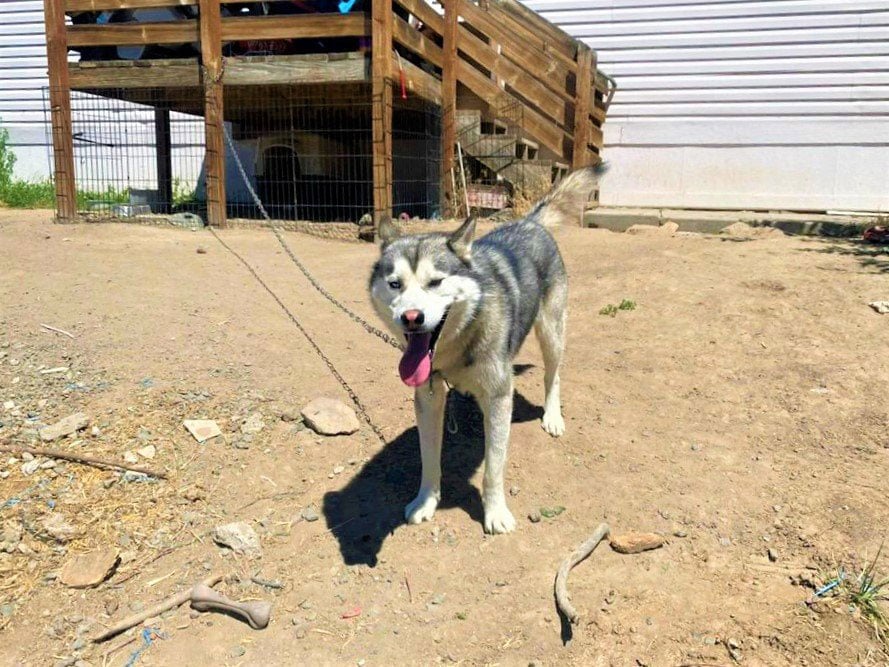
Photo courtesy of Fences for Fido
“That’s its home,” said Kennedy. “So, we’d much rather focus on keeping families together than tearing them apart.”
Kennedy emphasizes that if there is abuse or severe neglect they will do what they can to rehome the dog.
“We do not just leave a dog or build a fence and just leave a dog,” she said. “We make sure that they’re not going to stay in that situation.”
Kennedy said most of the time, it’s the guardian who contact FFF to request a fence. Frequently animal control has been involved and the family was warned that if they didn’t take the dog off the chain and fence the dog they’d be fined.
FFF was instrumental in getting Oregon’s 2014 dog tethering law passed. The law states that dogs must not spend more than 10 hours a day on a chain or tether or more than 15 hours a day fixed to a trolley or runner.
A Labor of Love
Most “builds” are simple so the fences are constructed quickly, but sometimes extra time is needed to deal with a yard overrun with blackberry bushes or a muddy property that requires the spreading of wood chips or straw to help keep the dog comfortable.
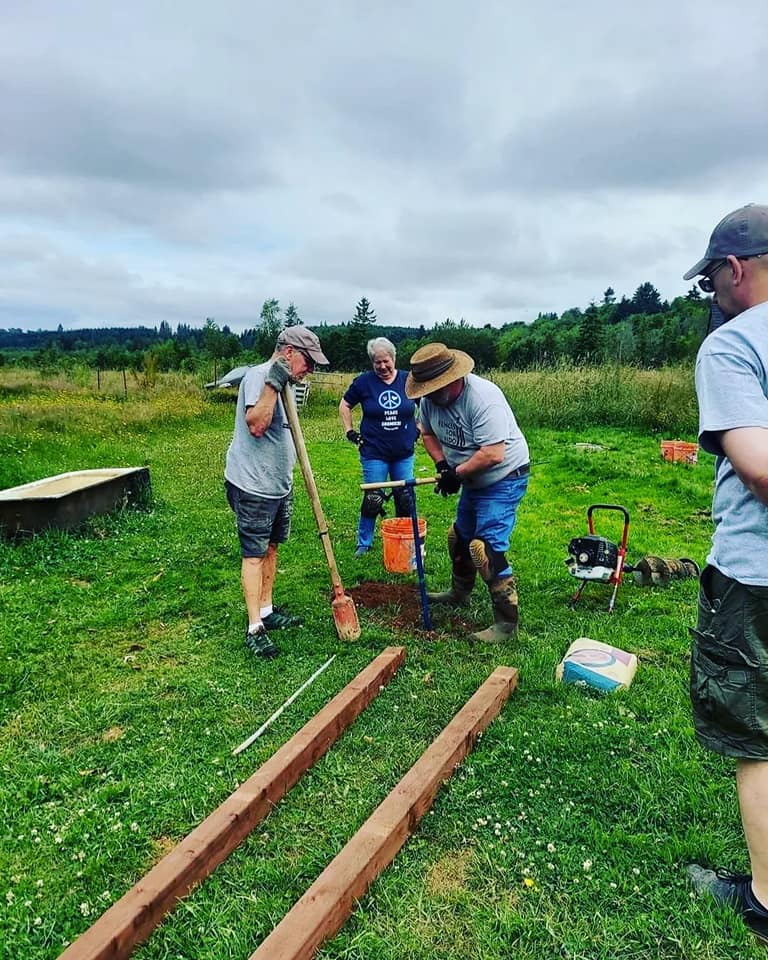
Volunteers install posts, secure wire fencing to the posts, and cut and lay ground wire. Photo courtesy of FFF
FFF operates on donations of money, materials, labor, and the occasional grant. On average, it costs between $1000–$1500 for each build (which can also include the costs of spaying/neutering, vaccinations, and multiple dog houses when needed). Volunteers install posts, secure wire fencing to the posts, cut and lay ground wire, assemble dog houses, and of course give the resident dog or dogs lots of love.
Let the Zoomies Begin
Once the fence is complete, the chain comes off and the zoomies start.
“Almost every single dog we’ve ever unchained will do the zoomies and seem to have a big smile on their face,” said Kennedy. “In the videos you can see the dog going up to every single volunteer, just giving a little nudge on the hand or something. And I just feel like that’s their way of saying thank you.”
“They know you’re there to help them, and they feel that freedom, more than just getting off of the chain,” she said. “They feel it, they know it. It’s an incredible thing to watch, and it tears me up every time.”
Kennedy said often it takes the dogs a minute to realize they are no longer chained.
“Then when they realize that they’re running circles and they’re marking the property and…all these little things that they’ve dreamed of doing,” she said.
Returning the Favor
In 2018, Mike Rowe and his Returning the Favor Facebook series surprised Fences for Fido, doing a feature on the organization and making a large donation of toys and supplies.
The team heads to Oregon to meet an incredible group of volunteers who are helping turn dog chains into dog shelters.
Posted by Returning The Favor on Wednesday, December 12, 2018
“It was wonderful that he chose us to do that,” said Kennedy.
Rowe met with volunteers and lent a hand in building a fence.
The video was viewed by more than 3 million people.
“It got the word out about our organization,” said Kennedy.
FFF provides mentoring for people who want to start their own unchaining group and have created the Unchained Planet project to further the cause.
The hope is that volunteer groups like Fences for Fido will be in every major city.
“That would be a dream come true,” said Kennedy.
Editor’s note: According to the Michigan State University Animal Legal and Historical Center, “as of 2022, 23 states and the District of Columbia have laws on dog tethering/chaining.”
If you are interested in working with your state legislators to help strengthen your state’s animal protection laws, check out the Animal Legal Defense Fund’s website for resources and actions you can take.
